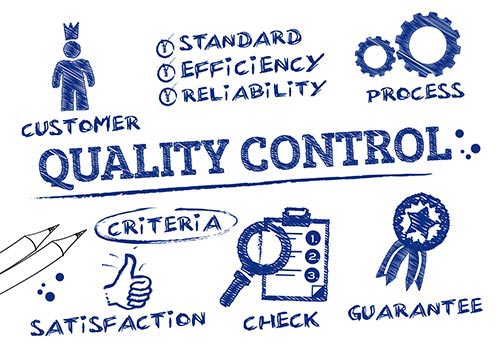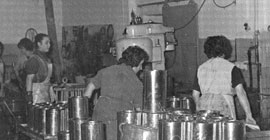 Certified preserved fruit is the guarantee that a good job in growing and processing the fruit to turn it into exquisite sweet products has been done… The regulations on hygiene and food safety are responsible for setting the minimum requirements in each country or economic zone (in Spain, EU regulations are followed). But, in addition, preserved fruit manufacturers can prove that they are above these requirements through certain international certifications, most of them common to all types of food.
Certified preserved fruit is the guarantee that a good job in growing and processing the fruit to turn it into exquisite sweet products has been done… The regulations on hygiene and food safety are responsible for setting the minimum requirements in each country or economic zone (in Spain, EU regulations are followed). But, in addition, preserved fruit manufacturers can prove that they are above these requirements through certain international certifications, most of them common to all types of food.

Certified preserved fruit in quality, safety and religious precepts
Today we are going to deal with this topic: the hygiene and food safety certifications preserved fruit can achieve, as well as quality accreditations and other certificates that ensure that these foods have been processed in accordance with the religious precepts of different communities (Halal for Muslims and Kosher for Jews).
What are food certificates?
Guarantee the safety of food at the time of its ingestion by consumers: this is the objective of food certifications. As hazards can stalk food at any stage of the food chain, proper control can ensure its safety. And this can only be achieved when the effort of all actors involved in food management is combined.

Certifications of systems, processes and products in the food industry are statements made by independent bodies that are useful to demonstrate compliance with certain national and international standards of reference. At present, there are numerous standards capable of evaluating, testing and encouraging good practices within the food industry. In general, they serve to reinforce consumer confidence and help companies enter new markets.
In addition, food certifications improve products and processes, resulting in fewer mistakes, refunds and claims. In this way, food accreditations may contribute to improve relations with suppliers and customers, and are reflected in operating cost reductions.
Hazard Analysis and Critical Control Points (HACCP), a “framework” standard
✔ What is it: HACCP (HACCP, in English) is not a standard in itself, but a preventive model widely recognized around the world to develop products that ensure food safety. It follows the precepts of the Codex Alimentarius of the United Nations Food and Agriculture Organization (FAO), and is the system on which other standards are based, such as some of the ones explained below. The function of HACCP is to identify, evaluate and prevent the risks of contamination of products at a physical, chemical and biological level along the entire supply chain. Its strong point is that it is based on anticipation and prevention, rather than on the inspection of the final product.
✔ Where is it recognized: internationally.
Main certifications in the food industry
ISO 9001 quality standard
✔ What is it: ISO 9001 is the standard on quality management that enjoys greater recognition internationally, and is valid for any company that sells products or services whatever their sector. It allows to implement a Quality Management System (QMS) in companies, making continuous improvement in production processes.
✔ Who issues the certificate: AENOR, on behalf of the International Organization for Standardization (ISO, according to its acronym in English). Previously, a certifying agency approved by AENOR carries out an audit (APPLUS, in the case of Lazaya).
✔ Where it is recognized: it is widely accepted throughout the world.
ISO 22000 food safety certificate
✔ What is it: ISO 22000 is the main international food safety and security standard for controlling the entire food industry production chain, whether they are primary producers, transport companies, machinery and equipment manufacturers, packaging producers or retailers.
✔ Who issues the certificate: AENOR, on behalf of the International Organization for Standardization (ISO, according to its acronym in English). Previously, a certifying agency approved by AENOR carries out an audit (APPLUS, in the case of Lazaya).
✔ Where it is recognized: it enjoys international recognition.
IFS quality and food safety standard
✔ What is it: The International Food Standard (IFS Food) is a private protocol implemented by a set of European distribution chains, which helps suppliers to supply safe products to Germany, France and Italy. The IFS certification has influence throughout continental Europe, as well as in these three countries.
✔ Who issues the certificate: International Featured Standards (IFS), through various collaborating agencies in each country.
✔ Where it is recognized: in Germany, France and Italy, although it serves as a reference for many others.
Halal certificate
✔ What it is: The Halal certificate determines if food complies with the Islamic precepts. It’s worth clarifying that Halal is a lifestyle, a global concept… All foods are Halal, except those identified as Haram by Sharia, or Islamic Law, such as pork and pork products, improperly slaughtered animals, ethanol and other toxins, carnivorous animals, blood, contaminated and dangerous foods, etc.
✔ Who issues the certificate: in Spain, the Halal Institute of the Islamic Board.
✔ Where it is recognized: wherever there are Muslim communities.
Kosher Certificate
✔ What it is: The Kosher certificate guarantees that a food complies with the precepts of the Jewish religion. The word Kosher in Hebrew means “fit” and refers to those foods considered adequate, and that have been manipulated and prepared according to the laws of Kashrut (Jewish dietary laws collected in the Torah). The Kosher certification guarantees the composition and ingredients of the food, but also its processing, putting the accent on the preparation and cleaning of the machines used.
✔ Who issues the certificate: there are different Kosher certification agencies, some with more prestige (for example, Star-K of the USA).
✔ Where it is recognized: wherever there are Jewish communities.
Lazaya’s certified preserved fruit
Lazaya’s certified preserved fruit has all the accreditations we have just listed before. In the manufacturing of our candied fruits and other preserved fruit we follow the guidelines of quality and food safety defined in the Hazard Analysis and Critical Control Points (HACCP). To achieve this, we perform various process and product controls, either internally or by outsourcing accredited external laboratories.
Currently, our certified preserved fruit has been entitled with the most prestigious certificates of quality and international food safety, such as ISO 9001, ISO 22000 and IFS. Our exporting vocation has also led us to accredit our fruit with Kosher and Halal certifications, which in many countries are required, but which are also positively valued in Western countries with large Jewish and Muslim communities.
Do you need to place an order from our catalogue of preserved fruit? Do you want to know more about our quality control in Lazaya’s factory in Calatayud? We are glad to help you and answer your questions. 🙂










